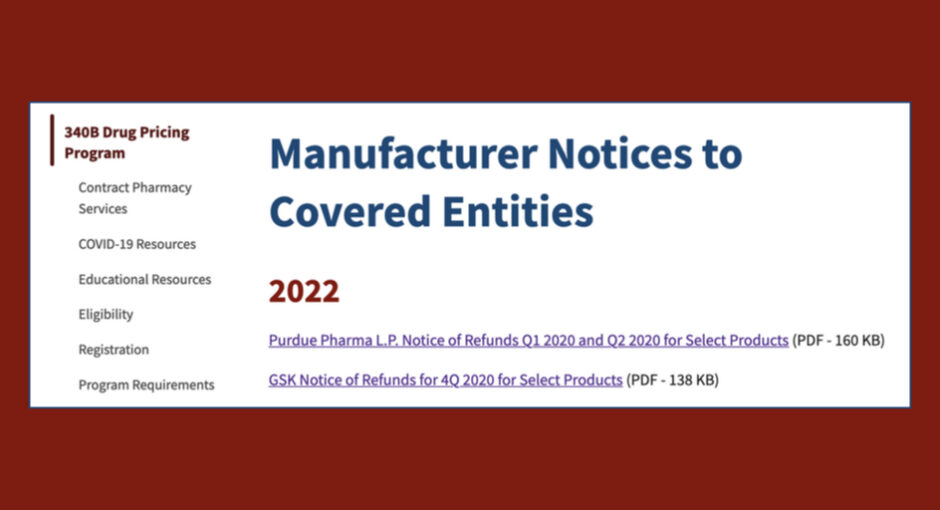Drug manufacturers GlaxoSmithKline and Purdue Pharma have announced refunds for overcharging 340B covered entities, GSK for the fourth time and Purdue for the second time this year.
The U.S. Health Resources and Services Administration (HRSA) recently posted the companies’ notices to entities on the Office of Pharmacy Affairs website.
All of GSK’s notices this year pertain to 340B pricing offered during 2020. Its latest notice covers prices on 15 NDCs during Q1 2020, all on inhaled medicines. In 2021 GSK announced refunds for overcharges on purchases of 17 NDCs during Q4 2019 and 26 NDCs during Q1 2019.
The company said it recalculated its 340B ceiling prices for the products as a result of revised Medicaid drug rebate pricing data submitted to the Centers for Medicare & Medicaid Services. GSK said in the notice it will send refund checks to entities owed $100 or more in aggregate. The notice includes contact information for entities that may be owed less than $100.
GSK is one of the 18 drug manufacturers that have imposed limits on 340B pricing when covered entities contract with outside pharmacies to dispense 340B-purchased drugs. It announced its policy in February.
Purdue’s notice for itself and its subsidiaries Avrio Health and Adlon Therapeutics covers 340B prices offered on 24 NDCs either during Q1 2020, Q2 2020, or both. The medicines include formulations of Oxycontin, Butrans, Colace, Senokot, Betadine, and Adhansia. Purdue did not say why it recalculated its 340B ceiling prices.
Purdue said it is working with Apexus, the 340B prime vendor, to process wholesaler credits for affected entities. Purdue’s notice has contact information for entities that believe they are owed a refund but are not contacted by Apexus.
In late July, Purdue posted a notice offering refunds for 340B overcharges on Betasept spanning 16 years. Purdue also posted a 340B refund notice in 2021, three in 2020, and one in 2019.
Purdue is widely known for its role in fueling the U.S. opioid epidemic. The privately held company and its owners have paid the federal and state governments billions of dollars to settle lawsuits related to its role, and the company in 2019 filed for Chapter 11 bankruptcy.
Drug manufacturers so far this year have posted 29 notices of refunds for 340B overcharges. The number of such notices has risen since 2019. HRSA that year launched a long-delayed secure website that gave entities access to manufacturers ceiling prices for covered outpatient drugs. It also implemented regulations authorizing civil monetary penalties against manufacturers for knowing and intentional 340B overcharges.


